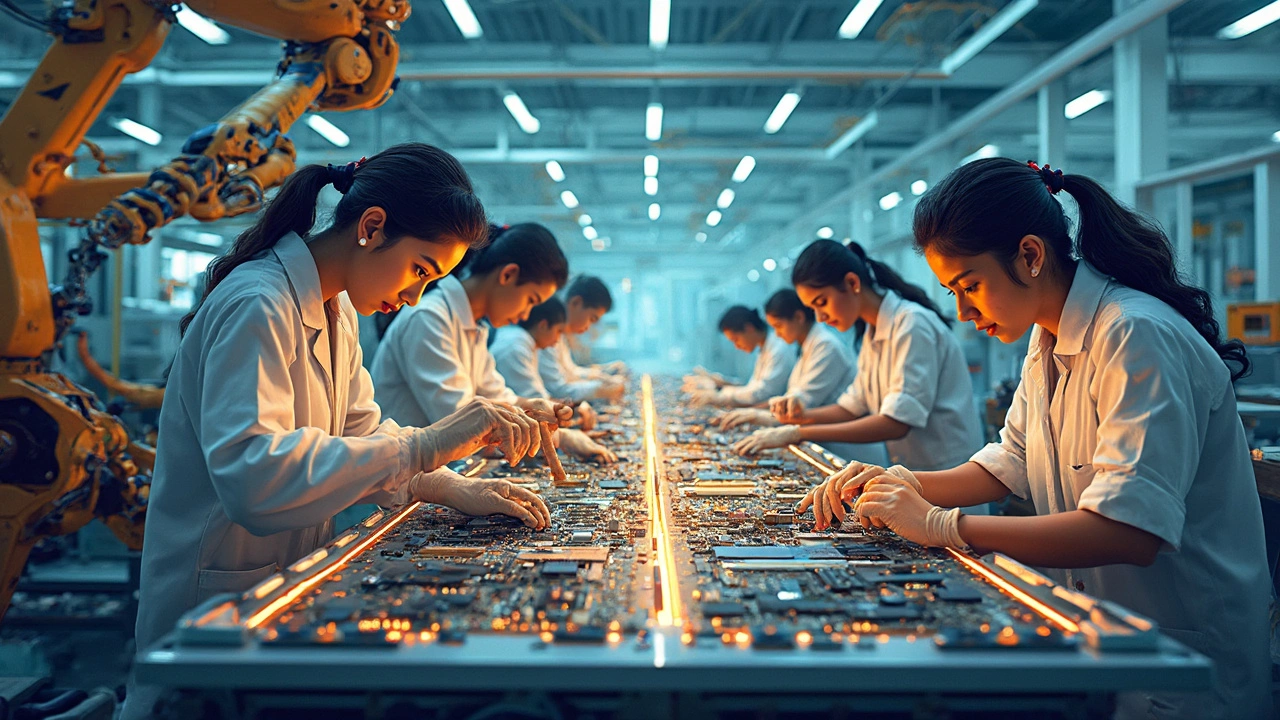When you think of electronics in India, Bangalore probably pops into your mind first. And for a good reason! This vibrant city isn't just about IT companies and traffic woes. It's also the buzzing center of electronic innovation and manufacturing in the country. With a rich pool of tech talent and forward-thinking infrastructure, Bangalore has rightfully earned its title as the electronics capital of India.
Why has Bangalore become such a hotspot? For starters, it's home to a robust ecosystem of startups and multinational corporations that are pushing the boundaries of what's possible in electronics. Companies like Infosys, Wipro, and numerous others are either homegrown or have significant operations here, contributing to the dynamic industry landscape.
The city has also benefited from supportive government initiatives, which have poured resources into developing both the physical and technological infrastructure needed for the electronics sector to thrive. The 'Make in India' campaign, for instance, has been a game-changer, attracting both domestic and foreign investments to the region.
- Why Bangalore is Called the Electronics Capital
- Infrastructure and Innovation
- Key Players and Companies
- Government Initiatives Boosting Growth
- Challenges and Future Prospects
Why Bangalore is Called the Electronics Capital
Bangalore, or Bengaluru if you want to get all official, isn't just a tech haven by chance. There's a whole ecosystem here that's made it the electronics capital of India. So, what's the magic recipe?
It All Starts with Talent
First off, the city is bursting with tech-savvy folks. Known as the Silicon Valley of India, universities and technology institutes like the Indian Institute of Science (IISc) and the National Institute of Fashion Technology (NIFT) are feeding an ever-growing pool of tech and design wizards. This critical mass of talent is a huge pull for companies looking to innovate in electronics manufacturing.
Infrastructure That Supports Growth
It's not just about the people. Bangalore boasts a solid infrastructure that helps companies make it big in the electronics world. This includes numerous tech parks such as Electronic City, which houses hundreds of IT and electronics firms, creating a nurturing environment for both established players and startups.
Government Backing
The government has kicked into high gear with initiatives like the Make in India and Digital India programs. These initiatives not just encourage global brands to set up shop but also emphasize homegrown talent and industries. Incentives, subsidies, and streamlined processes have made it easier for companies to navigate the business landscape.
| Year | Electronics Market Growth (%) |
|---|---|
| 2020 | 5.2 |
| 2021 | 6.8 |
| 2022 | 7.5 |
This focus has spurred noticeable growth, with the electronics market seeing a steady increase as shown in the table above.
Networking and Collaboration
Let's not forget the role of networking. Bangalore is host to a slew of conferences, workshops, and industry events. These gatherings are breeding grounds for collaboration and innovation. Whether it's a startup or a giant corporation, the chance to exchange ideas and form partnerships has placed Bangalore on the map.
In a nutshell, Bangalore combines talent, infrastructure, and proactive governance to make it the undisputed electronics hub in India. It's not just about the present achievements but also about setting the foundation for future growth and innovation in the sector.
Infrastructure and Innovation
Stepping into Bangalore, you immediately sense the pulse of innovation. The city boasts a remarkable infrastructure that's tailor-made for electronics manufacturing, setting it apart as the top choice in India. This infrastructure supports a buzzing ecosystem filled with research institutions, tech parks, and seamless connectivity.
Tech Parks and Research Hubs
Bangalore's tech landscape is dotted with numerous tech parks that cater to electronics firms. The International Tech Park Bangalore (ITPB) and Electronic City are just two of the many sprawling areas that house hundreds of companies. They provide world-class facilities that meet the needs of small startups and large enterprises alike, offering spaces that encourage collaboration and innovation.
Connectivity and Logistics
The city's connectivity is something to brag about. With a well-connected network of roads and a new metro extension underway, getting to these parks isn't a hassle. Kempegowda International Airport offers international and regional flights, easing logistics, which is vital for electronics businesses reliant on global supply chains.
Innovation Centers and Incubators
The presence of innovation centers and incubators fuels the fire of creativity. Institutions like the Indian Institute of Science (IISc) and various incubator programs offer platforms for startups to test and develop new technology. This environment nurtures fresh ideas and keeps the industry's momentum going.
| Stats | Details |
|---|---|
| Tech Parks | 50+ major parks and growing |
| Connectivity Rating | 9/10 for logistics efficiency |
| Innovation Centers | 20+ active hubs |
In summary, Bangalore's infrastructure and focus on innovation make it the undisputed electronics capital of India. Whether it's the effortless logistics, ample tech parks, or the enthusiasm for groundbreaking technology, this city is well-equipped to lead the charge in electronics manufacturing.

Key Players and Companies
When it comes to the electronics capital of India, Bangalore stands out with a mix of homegrown and international companies. These players have turned the city into a vibrant hub of innovation and manufacturing prowess.
Local Giants
Infosys and Wipro are two big names that have their roots in Bangalore. While they started in the IT and software realm, their expertise has significantly impacted the electronics sector by providing tech solutions that seamlessly integrate with hardware.
Global Powerhouses
Bangalore isn't just about the local giants. Companies like Samsung, Dell, and Intel have established key operations in the city. For instance, Intel's Bangalore campus is one of its largest outside of the U.S., focusing on cutting-edge R&D that guides innovation in electronics worldwide.
Startups Making Waves
Bangalore's spirit of entrepreneurship is alive and well, with a bustling ecosystem of startups like Tejas Networks, which focuses on creating broadband access solutions. These young companies bring fresh ideas and vigor, contributing to the city's reputation as an innovation hub.
Joining this vibrant landscape are incubators and accelerators that support new ventures, boosting their chances of success in the competitive India manufacturing environment.
Collaboration with Educational Institutions
Another strength of Bangalore's electronics scene is the strong link with local educational institutions. Places like the Indian Institute of Science (IISc) and various tech universities provide a continuous flow of skilled professionals and cutting-edge research.
| Company | Sector | Impact |
|---|---|---|
| Infosys | IT & Software | Tech solutions for electronics |
| Samsung | Consumer Electronics | R&D and manufacturing |
| Tejas Networks | Telecom | Broadband solutions |
These companies and institutions work hand in hand to push the limits of technology, reaffirming Bangalore's spot as a key player in the global electronics arena.
Government Initiatives Boosting Growth
The Indian government has been playing a crucial role in boosting the electronics manufacturing scene, especially in Bangalore. With strategic policies and supportive measures, they're not just enhancing the city's capabilities but the national landscape too.
Make in India Campaign
The 'Make in India' initiative has been revolutionary. Launched in 2014, it aims to turn India into a global manufacturing hub by encouraging both local and international companies to produce within the country. And boy, has it worked wonders! This has led to increased foreign investment, fostering an environment that encourages cutting-edge manufacturing in sectors like electronics.
Modified Special Incentive Package Scheme (M-SIPS)
This scheme has been particularly beneficial for electronics manufacturing. It offers financial incentives to offset the disability costs related to domestic manufacturing. With this, the government hopes to reduce reliance on imports and bolster domestic production capacities.
Electronic Development Fund (EDF)
To spur innovation, the EDF was set up, providing risk capital to companies working on electronics, nano-electronics, and IT. By addressing the initial funding gaps, this fund has been a game-changer for startups and established firms looking to innovate within India.
The combination of these initiatives has made Bangalore a more attractive destination for electronic manufacturing firms, providing not just incentives but also creating an overall business-friendly environment.

Challenges and Future Prospects
Even though Bangalore is soaring as India's electronics capital, it's not all sunshine and roses. The city faces a few bumps in the road that it needs to address to keep growing. First, there's the issue of infrastructure. While things have improved a lot, traffic congestion is still a nightmare and can delay the transport of goods.
Then, there's the challenge of sustainability. As the region expands, it's crucial to focus on environmentally friendly manufacturing processes. Pollution and waste management need immediate attention if Bangalore wants to pave the way to a cleaner, greener future.
Skilling the Workforce
Another hurdle is making sure the workforce keeps up with ever-evolving technology. While Bangalore is brimming with tech talent, the demand for specialized skills is rising. Companies and educational institutes need to collaborate more closely to ensure that the workforce is not only skilled but ready for future challenges.
Future Prospects: Setting a Global Benchmark
Despite these challenges, the future looks pretty bright. With Bangalore being a part of the Make in India initiative, the city is set to attract more foreign investments. More companies are likely to establish R&D centers, making Bangalore a global hub for electronics.
There's even talk of the government boosting incentives for startups and innovators in the region. This move could fuel even more advancements and solidify Bangalore's position as the true heart of electronics manufacturing in India.
Table: Potential Growth Indicators
| Indicator | Expected Growth |
|---|---|
| Investment in R&D | 20% annually |
| Workforce Skill Development | 15% increase in training programs |
| Sustainable Practices | 25% improvement in eco-friendly practices by 2030 |
In summary, while Bangalore has its fair share of challenges to tackle, proactive measures can convert these challenges into opportunities. With continuous investments and a dedicated focus on skilling up, Bangalore’s future in the electronics manufacturing world seems sky-high.
